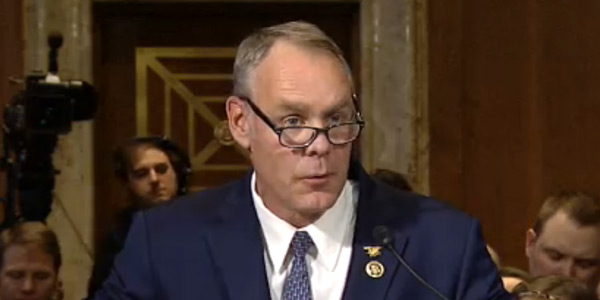By Rich Heidorn Jr.
WASHINGTON — President-elect Donald Trump’s nominee to head the Interior Department told a Senate panel Tuesday that climate change is real but that he would continue to allow fossil fuel production on public lands.
“We need an economy and jobs, too,” Rep. Ryan Zinke (R-Mont.) told the Senate Energy and Natural Resources Committee during a nearly four-hour confirmation hearing. The former Navy Seal attempted to steer a path between climate deniers and fossil fuel opponents, citing President Theodore Roosevelt as a model and calling for continuation of an “all of the above” approach to energy production.
Sen. Bernie Sanders (I-Vt.) asked Zinke whether he agreed with Trump, who has called climate change a “hoax.”
“I don’t believe it’s a hoax,” Zinke responded.
“The climate is changing. That’s undisputable. [My district includes] Glacier National Park. I’ve seen glaciers over the period of my time recede,” Zinke said. “Man has had an influence. I think that’s undisputable as well … I think where there’s debate on it is what that influence is and what can we do about it.”
“There is a debate on this committee but not within the scientific community,” Sanders interrupted, before asking whether the U.S. should continue to allow fossil fuels to be produced on federal land.
Zinke said it is preferable to produce energy domestically, “under reasonable regulations,” rather than depend on foreign energy production without environmental rules.
‘War on Coal’

In response to a question from Sen. John Barrasso (R-Wyo.), Zinke pledged to reverse the Obama administration’s moratorium on coal mining on federal lands.
“The war on coal I believe is real,” he said. “The moratorium, I think, was an example of one-size-fits-all [policy]. It was a view from Washington and not a view from the states.”
He called for investing in research and development on coal. “We know we have the asset. Let’s work together to make it cleaner, better. We should be leading the world in clean energy technology and I’m pretty confident that coal can be a part of that,” he said. “But it is about science. It is about investing in our future and not looking at our past.”
Zinke also promised to support Barrasso’s plan to use the Congressional Review Act to overturn the Bureau of Land Management’s Nov. 15 rule regulating venting and flaring rule of natural gas.
Zinke said he was troubled by the volumes of natural gas vented during production. “The amount of venting in North Dakota alone almost exceeds what we get out of the fields. A lot of the wasting can be [eliminated] by having the infrastructure [to capture it]. So let us build a system where we capture that energy that’s otherwise being wasted. That’s an enormous opportunity.”
Mining Restoration

Ranking member Sen. Maria Cantwell (D-Wash.) pressed Zinke on whether he would support an end to current policy allowing surface coal mine operators to “self-bond” for their obligations to reclaim lands. She cited a Government Accountability Office report released Tuesday that found all other energy and mineral producers on federal lands — mineral mines, onshore oil and gas drilling and wind and solar production — are required to purchase third-party bonds.
“I think bonding is important,” Zinke answered. “I think we need to have the courage today to look 100 years forward [so we can] look back and say we did it right.”
“Well, I hope that was a great endorsement of the stream protection rule,” Cantwell responded, smiling. The rule, issued by the Interior Department on Dec. 19, requires coal companies to restore their land to its condition before mining began, an effort to prevent mining debris from contaminating streams. It, too, is a target for Congressional repeal. (See Cost Trends Favor Renewables Despite Coming Policy Shifts.)





